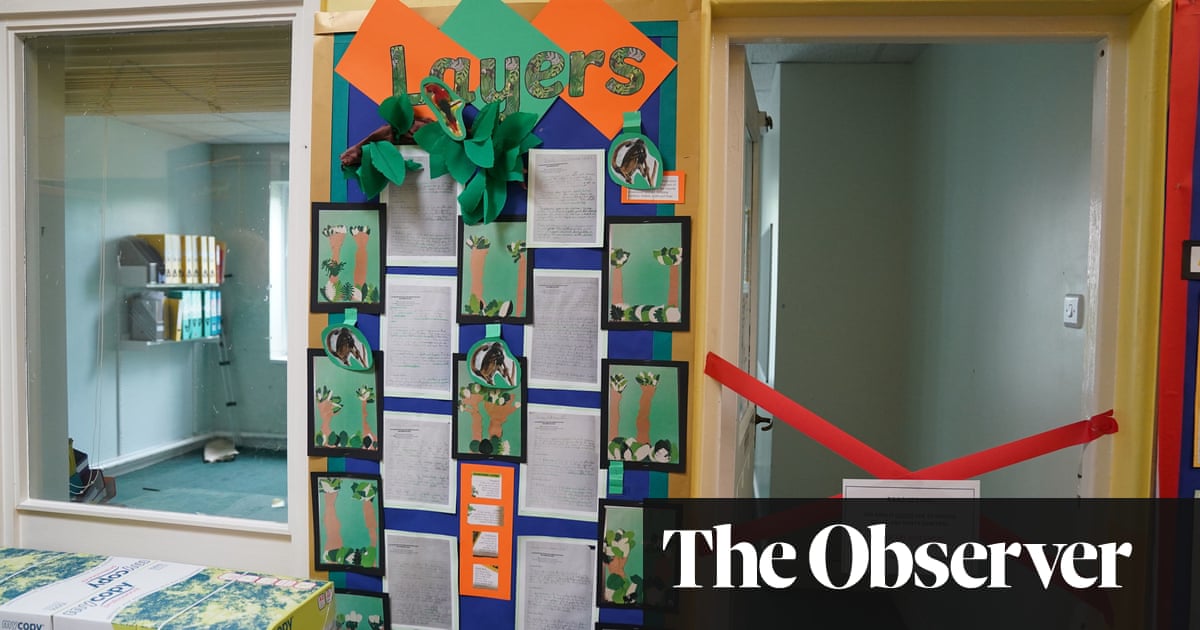
Crumbling and potentially dangerous concrete has been found in 174 English schools, 27 more than previously known, as ministers face criticism for a slow response to the crisis.
As it emerged that only 11 schools have temporary classrooms in place out of the at least 29 that require them, the education secretary, Gillian Keegan, said some pupils had told her they preferred being taught in portable cabins. A total of 250 temporary units have been ordered to help schools unable to use certain areas.
In a revised list of schools affected by reinforced autoclaved aerated concrete (Raac), the first official government update on the crisis in a fortnight, the Department for Education (DfE) said 23 schools were having to use a mix of virtual and in-person learning, three more than before. However, only one school is being forced to use entirely remote learning, down from four in the initial list, and none are completely closed.
MPs on the education select committee criticised the DfE’s response to the problem, with one saying the department had shown a “computer says no” attitude, quibbling over requests for small amounts of funding and being slow to provide mobile classrooms.
The permanent secretary at the DfE, Susan Acland-Hood, revealed that almost 250 temporary classrooms had been ordered by schools affected by Raac, but so far just 11 schools had them in place. She said considerably fewer than 250 might eventually be needed.
Mark Francois, the Conservative MP for Rayleigh and Wickford, in Essex, which has 53 schools affected by Raac, claimed some headteachers with schools affected by Raac had had to use their own money to pay for vital items.
He said one primary headteacher in his constituency was challenged over the cost of a £50 whiteboard. And Hockley primary school, which found out about Raac in its building earlier in the year and had been promised eight temporary classrooms from 4 September, had now been told they would not arrive until mid-November.
Francois said the DfE needed to slice through a “computer says no” bureaucracy: “We really do need a wartime mentality. In some cases, heads have had to dip into their own pockets to pay for vital supplies that the department would not fund. Surely we can do better than that?”
In an urgent question on the subject in the Commons, Bridget Phillipson, the shadow education secretary, said the government’s response to Raac had been a “colossal shambles”. She said that while safety advice on the issue arrived on 21 August, Keegan had waited four days before acting.
Keegan replied that after receiving the updated safety advice, she had asked for further technical guidance. Questioned about the provision of temporary classrooms, she argued that these were not necessarily a significant hardship for children.
She told MPs: “I would just like to say as well, in terms of the Portakabins, I have been to a number of these schools and seen children and met children in the Portakabins, and in fact at the first school I went to, the children were all petitioning me to stay in the Portakabin because they actually preferred it to the classroom.”
Before releasing the update, the DfE had been facing pressure to provide more information on the schools affected by Raac, a cheaper, lighter form of concrete with a suggested 30-year lifespan that was used to build schools and other public buildings from the 1950s to 1990s.
Paul Whiteman, the general secretary of the National Association of Head Teachers, the union representing headteachers and other school leaders, said there was a lack of longer-term answers.
“We still need a real sense of a clear plan, not just to put short-term mitigation measures in place, but to properly repair or replace buildings so they are fit for purpose,” he said. “Propping up ceilings with metal poles is clearly not a serious option in the medium or long term.”
While the lifespan of Raac was known for years, and thus the potential risks, the alert came after a series of sudden failures of Raac-built structures in recent months, which forced large numbers of headteachers and schools to make alternative arrangements.
Labour has been critical of the lack of updates, saying some schools were struggling to discover what costs the DfE would cover, slowing down the implementation of some mitigation measures.












